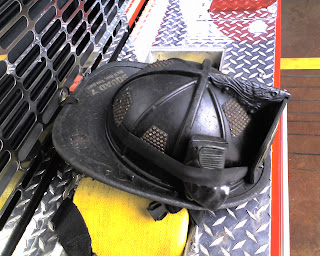I'm just sitting here, trying to think of something to do at 0200. The cable's out, it's too late to go out, and there's not a lot to do on a weeknight anyway. I've got some stupid movie I've seen 1,000 times playing, and a snoozing kitten curled up behind my knees.
Insomnia is NOT fun!
Sitting here, I've been thinking a lot about how things at work play out sometimes. Usually, there's an element of controlled chaos on critical scenes. We have so many of our people standing in such a small area around the patient that it's nearly impossible to do anything.
I had a call run like clockwork a few shifts ago...It was a beautiful thing.
I was on the Squad at the station when we were toned out with our Rescue crew for a patient having chest pains. Arriving onscene, our patient is sitting on the front lawn, complaining of classic MI or heart attack symptoms.
Here's where everything fell into place perfectly.
I grabbed a set of vitals, blood pressure, pulse, O2 saturation, glucose level, and respirations. Meanwhile, my medic partner (also my Captain) placed the leads and ran a 12-lead EKG.
As I started an IV in the patient's hand, he was given his first spray of Nitro and a dose of Asprin.
My partner gathered more medical information from our patient as I started to re-check his vitals.
<Insert the Rescue arriving onscene here>
The patient was moved to the stretcher and given a 2nd spray of Nitro, then loaded into the Rescue and rushed to the hospital.
Last I heard, he's doing fine.
Things just went perfectly. The 2 of us were able to do everything we needed to do without crowding each other or getting in each other's way. We had the patient pretty much packaged and ready to go, all he needed was a ride to the hospital by the time the Rescue showed up. We spent a total of 8 minutes onscene, from the Squad arriving, until the Rescue left the scene with the patient.
It was refreshing to see how a call should be run. I just wish it happened more often. The main problem I believe is that we run so many bull sh*t calls that we become a bit complacent. That, and when you're on your umpteenth call and you've been up almost 24 hours straight, you may get the job done, but what happens to the quality of care?
It's hard, I'll be one of the first to admit it. I've fallen asleep in the front seat of the truck at the hospital. I've run to the hospital lights and siren just so I'd have the lights, noise, and speed to make me focus on my driving and wake me up a bit more. I've teched on BS calls just so I could finish my PCR and doze off enroute to the hospital between rechecks of the paitient's vitals. I even fell asleep standing up at the station once.
24 hour shifts are hard, especially at such a busy station. For those who don't know, all 3 trucks at my station average 15-20 calls each and every shift. There's no rest for the weary and as much as I love what I get to do, I wouldn't wish 24's on anybody.
I think I'm gonna try to crash out....be safe and take care

2 comments:
HI,
Welcome back.. It's nice to see your log up and running again.
I've enjoyed it.
Jinx
Well... I know whachur saying with the twentyfours.... its almost 4 am here now... I WAS sleeping fine until we got toned out for a res strx fire that ended up a big nothing.... a big nothing after you pack out and drive in the back of an ancient open-backed firetruck to the scene. I'm still so friggin cold, I can't feel my feet.
Glad your MI Pt went so smoothly. :-)
Post a Comment